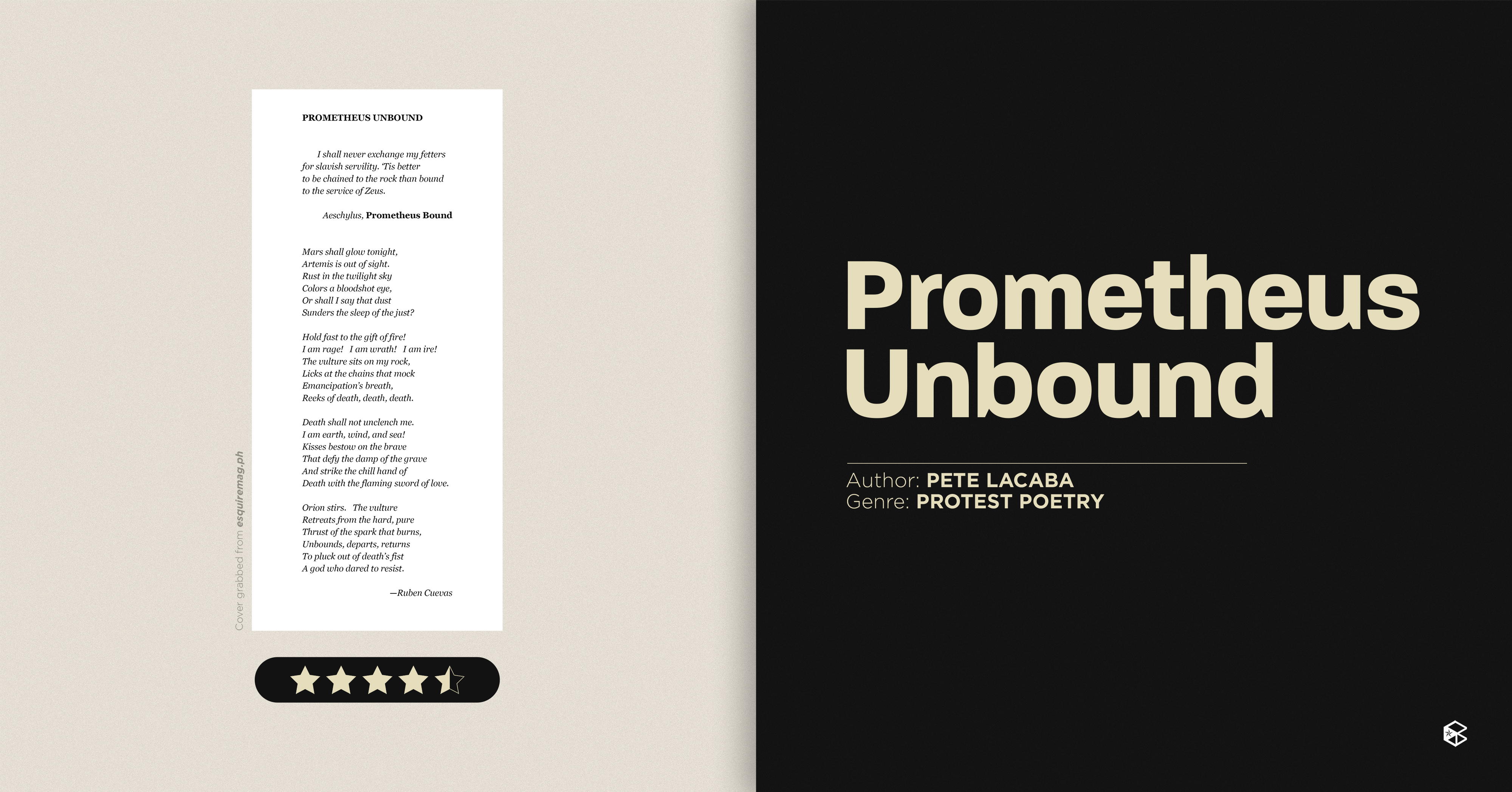Written by Jose Maria Flores Lacaba, also known as “Pete Lacaba,” a Filipino poet, screenwriter, and journalist best known for his poetry and his coverage of the “First Quarter Storm” during the Marcos Regime, “Prometheus Unbound” published by Focus Magazine in 1973 under the pseudonym Ruben Cuevas, is a classic example of subtle protest poetry meant to speak up against the injustices of Martial Law.
In Greek mythology, the Titan Prometheus was most famous for his crime against Zeus and Olympus. Sympathizing with the primitive state of man and their dependence on the Gods, Prometheus broke into Hephaestus’ workshop and stole fire, eventually giving that gift to man in order to aid them in their troubles. And though the titan had made a significant impact on the progress of man, his act would not go unpunished as Zeus tortured him by binding him to a rock and having an eagle peck at the titan’s self-healing liver, tormenting him for many years to come.
Gods to titans. Dictators to countrymen. There are a lot of parallels to be drawn between the two. The poem begins with what seems to be a stanza from the Aeschylean Greek tragedy similarly titled Prometheus Bound.
I shall never exchange my fetters
For slavish servility. 'Tis better
to be chained to the rock than bound
to the service of Zeus.
Aeschylus, Prometheus Bound
At first glance, the piece can seem like a simple retelling of the Greek myth. But reading between the lines (both literally and figuratively) you start to see its true message. Like mentioned earlier, the poem is acrostic—reading the first letter of every line forms its own set of words, and in this case, those words were: “Marcos Hitler Diktador Tuta,” a popular Tagalog slogan among protestors of the time.
Lacaba took a big risk not only writing the piece but also sneaking it past media censorship and publishing it. Even under a pseudonym, it was a gamble that most writers would not have taken. Any public criticism of Marcoses at the time, no matter how small, was usually met with punishment—punishment that Lacada would experience first hand in just a few months later. But as soon as people realized that the poem wasn’t what it seemed, the magazine was pulled from newsstands by men in uniform.
This begs the question: is it worth risking one’s life to spread a message when many would rather remain silent? The final stanza of the poem says a lot about this.
Orion stirs. The vulture
Retreats from the bard, pure
Thrust of the spark that burns,
Unbounds, departs, returns
To pluck out of death's fist
A god who dared to resist.
The mention of Orion is a curious one as Artemis was mentioned in the first stanza. There is a version of Orion’s story where he actually falls in love with Artemis, only for her to be tricked by her brother, Apollo, into unintentionally killing him later on. Thinking about Orion and Artemis as two parts of the people, with the former being the protesters, and the latter being everyone else. Apollo can be those in power, twisting the narrative and tricking the people to put down those who love and fight for them.
The vulture can be seen as a symbol of a corrupt government throughout the whole piece, those who mock the weak and feast upon their life-drained corpses. It retreats from the bard; the poet, the journalist, the storyteller. And once they are free, no longer threatened by the gloom of death, no one can be denied from speaking the truth. But we wouldn’t get there if there weren’t those willing to risk it all for the chance to give everyone that voice.
Prometheus gave man the gift of fire, allowing them to progress and live in a world that is no longer dictated by the Gods. But maybe for us, the gift of fire is simply the knowledge that those in power can’t keep us all restrained. Because like Prometheus, in the quest for freedom against those who’d rather stay in control, our silence during times like these is exactly what they want.


